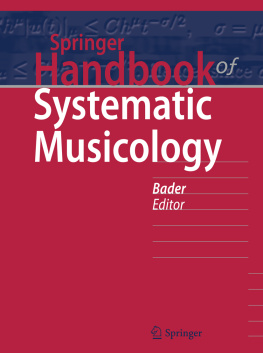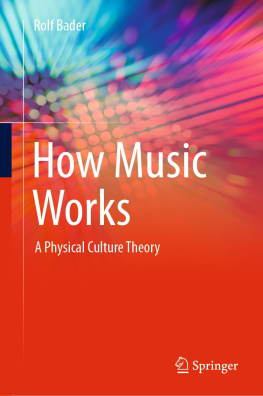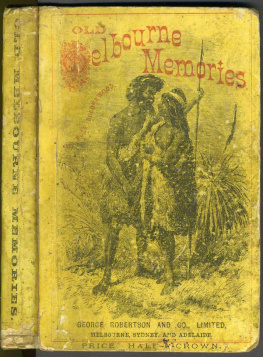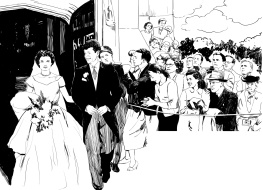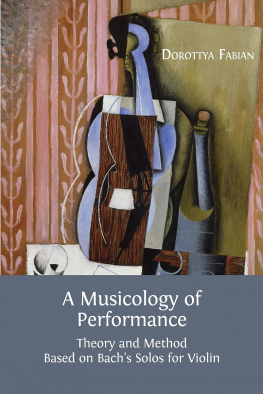Rolf Bader - Springer Handbook of Systematic Musicology
Here you can read online Rolf Bader - Springer Handbook of Systematic Musicology full text of the book (entire story) in english for free. Download pdf and epub, get meaning, cover and reviews about this ebook. City: Berlin;Heidelberg, publisher: Springer, genre: Romance novel. Description of the work, (preface) as well as reviews are available. Best literature library LitArk.com created for fans of good reading and offers a wide selection of genres:
Romance novel
Science fiction
Adventure
Detective
Science
History
Home and family
Prose
Art
Politics
Computer
Non-fiction
Religion
Business
Children
Humor
Choose a favorite category and find really read worthwhile books. Enjoy immersion in the world of imagination, feel the emotions of the characters or learn something new for yourself, make an fascinating discovery.
- Book:Springer Handbook of Systematic Musicology
- Author:
- Publisher:Springer
- Genre:
- City:Berlin;Heidelberg
- Rating:3 / 5
- Favourites:Add to favourites
- Your mark:
- 60
- 1
- 2
- 3
- 4
- 5
Springer Handbook of Systematic Musicology: summary, description and annotation
We offer to read an annotation, description, summary or preface (depends on what the author of the book "Springer Handbook of Systematic Musicology" wrote himself). If you haven't found the necessary information about the book — write in the comments, we will try to find it.
Springer Handbook of Systematic Musicology — read online for free the complete book (whole text) full work
Below is the text of the book, divided by pages. System saving the place of the last page read, allows you to conveniently read the book "Springer Handbook of Systematic Musicology" online for free, without having to search again every time where you left off. Put a bookmark, and you can go to the page where you finished reading at any time.
Font size:
Interval:
Bookmark:
 known as a Pythagorean Tetraktys, which contains the intervals of the octave 12, the fifth 23, the fourth 34, and the whole tone 89. Ratios considered as fundamental for harmony could either contain multiples of a basic number like (21, 31, 41), or be formed according to
known as a Pythagorean Tetraktys, which contains the intervals of the octave 12, the fifth 23, the fourth 34, and the whole tone 89. Ratios considered as fundamental for harmony could either contain multiples of a basic number like (21, 31, 41), or be formed according to  (the class of superparticular intervals 32, 43, 54, 65, 76, 87, 98, ). In addition, there were so-called superpartientes (ratios of the form
(the class of superparticular intervals 32, 43, 54, 65, 76, 87, 98, ). In addition, there were so-called superpartientes (ratios of the form  like 53 considered in particular by a range of medieval scholars []), who opposed empiricism, in fact let Socrates refer to the Pythagoreans as people who torture strings by working on their tension with tuning pegs. Archytas it seems already distinguished between the arithmetic, the geometric and the harmonic division (that can be applied either to an interval defined by numbers or to sectioning a line or string of given length). Though observation was used as a method for scientific investigations, mathematical reasoning among the Pythagoreans was regarded superior for its logical coherence and general applicability.
like 53 considered in particular by a range of medieval scholars []), who opposed empiricism, in fact let Socrates refer to the Pythagoreans as people who torture strings by working on their tension with tuning pegs. Archytas it seems already distinguished between the arithmetic, the geometric and the harmonic division (that can be applied either to an interval defined by numbers or to sectioning a line or string of given length). Though observation was used as a method for scientific investigations, mathematical reasoning among the Pythagoreans was regarded superior for its logical coherence and general applicability.Font size:
Interval:
Bookmark:
Similar books «Springer Handbook of Systematic Musicology»
Look at similar books to Springer Handbook of Systematic Musicology. We have selected literature similar in name and meaning in the hope of providing readers with more options to find new, interesting, not yet read works.
Discussion, reviews of the book Springer Handbook of Systematic Musicology and just readers' own opinions. Leave your comments, write what you think about the work, its meaning or the main characters. Specify what exactly you liked and what you didn't like, and why you think so.

